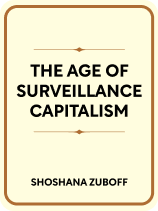

This article is an excerpt from the Shortform book guide to "The Age of Surveillance Capitalism" by Shoshana Zuboff. Shortform has the world's best summaries and analyses of books you should be reading.
Like this article? Sign up for a free trial here.
Want an overview of Shoshana Zuboff’s The Age of Surveillance Capitalism? What are the book’s main points and takeaways?
In her book, The Age of Surveillance Capitalism, author and Harvard professor Shoshana Zuboff explains the concept, history, and consequences of big tech companies monitoring user behavior online. According to her, surveillance capitalism poses a threat to society and your personal freedoms.
Read on for a brief overview of Shoshana Zuboff’s The Age of Surveillance Capitalism.
Zuboff’s The Age of Surveillance Capitalism
Are you aware that you’re being watched by big tech companies? In The Age of Surveillance Capitalism, Shoshana Zuboff explores the concept and consequences of “surveillance capitalism”—a term she created to describe the invasive and controlling data collection practices that tech companies like Google, Microsoft, and Facebook have adopted to maximize their profits. By learning about these practices, you’ll be better equipped to protect your privacy and fight to protect the privacy of us all.
In The Age of Surveillance Capitalism, Shoshana Zuboff explores “surveillance capitalism”—Zuboff uses scientific research and numerous real-life examples to support her insights into the development and advancement of surveillance capitalism. She also warns of the potentially disastrous outcomes for our society if we don’t advocate for change in this area.
The Age of Surveillance Capitalism is one of three books that Shoshana Zuboff has written about different defining stages of technological development. It’s the culmination of years of research that she conducted while a professor at Harvard University.
In general, the book covers these topics:
- What surveillance capitalism is
- The conditions that spurred its development
- How it’s been able to thrive despite growing opposition
- How it intends to shape our future
- Why we should be concerned about it
- What we can do to prevent it from destroying our freedom and democracy
How Surveillance Capitalism Operates
Shoshana Zuboff’s The Age of Surveillance Capitalism tells us that surveillance capitalism consists of four main components: an underlying philosophy, products, a means of production, and a marketplace. Let’s discuss each component in more detail.
Zuboff explains that although people tend to see surveillance capitalism as a type of advanced technology that’s capable of learning uncomfortably specific details about us, it’s actually a philosophy that guides how companies use technology.
The idea underlying surveillance capitalism is that serving people’s needs is less profitable and therefore less desirable than selling predictions about their future behavior. Through this lens, technology isn’t a means to make our lives better, but rather a means through which companies can better collect and control our data to maximize profits. In other words, in surveillance capitalism, the purpose of technology is to help companies collect more data, make more accurate predictions, and sell those predictions for more money.
(Shortform note: According to Shoshana Zuboff’s The Age of Surveillance Capitalism, the philosophy of surveillance capitalism is that selling behavioral predictions is more profitable than serving people’s needs. Why is this so concerning? In his book Basic Economics, Thomas Sowell explains that, in a free market economy, the promise of higher profits is supposed to incentivize businesses to produce goods and services that people want. If companies can earn higher profits without concerning themselves with the needs of consumers, the system breaks down and the people suffer.)
Why Surveillance Capitalism Has Managed to Thrive
How have Google (and, later, other companies) managed to keep mining user data despite showing such blatant disregard for privacy? Zuboff argues that there are a variety of factors that have contributed to surveillance capitalism’s ability to thrive. These factors fall into three categories: overcoming opposition, cornering the public, and mastering the art of disguise. Let’s discuss each of them further.
Shoshana Zuboff’s The Age of Surveillance Capitalism argues that Google and its competitors have learned to overcome any form of opposition, making it difficult for the public to demand—and lawmakers to enact—change.
Tech companies have refused to take accountability. These companies have never stopped to consider whether their actions are immoral or against public opinion and have proceeded unfazed by any and all attempts to raise concern.
(Shortform note: Do companies have moral responsibility, as Zuboff seems to suggest here? Some would argue that they don’t. According to the legal compliance view argued by Milton Friedman, corporations have no moral obligations outside of their legal obligations.)
Tech companies have developed strong defenses. Google (and, later, its competitors in a similar fashion) has defended itself from governmental threats by proving its value to political campaigns, investing in lobbying, and building close ties with Washington.
(Shortform note: Just how involved is Google in the political sphere? According to reports, in 2018, Google spent $21 million on federal lobbying, more than any other company in the US. In addition, as of 2019, its public policy division provided funding to 349 different organizations— including academic institutions, trade organizations, and advocacy groups—that work to defend Google and its practices.)
Zuboff: Surveillance Capitalism Threatens Our Privacy
Shoshana Zuboff’s The Age of Surveillance Capitalism explains that companies often collect information without the knowledge or meaningful consent of their consumers. Additionally, they invade personal spaces—both physical and psychological—to do so.
For example, she says that even when we’re inside our homes, devices like TVs, thermostats, and even mattresses are monitoring and delivering information about what we say and do to company computers. In addition, companies can analyze metadata—like how often you change your profile picture—to determine extremely specific information that you never intentionally disclosed, such as whether or not you have depression.
| How Far Does Privacy Invasion Go? Here, Zuboff warns that tech companies are violating our privacy by invading our personal spaces and analyzing our metadata for extremely specific personal information. Arguably an even more severe threat to privacy is that these companies share this private information with law enforcement agencies without people’s knowledge or consent and without the required warrants. For example, according to one report, law enforcement demanded seven days of location information from a man’s cell phone provider in connection with a criminal investigation. Fortunately, however, when the case was taken to the US Supreme Court in 2018, the Court ruled that his location information was protected by his Fourth Amendment rights, meaning law enforcement needed a warrant to access it. That said, whether this ruling will serve as a precedent for future cases involving privacy and technology remains to be seen. |

———End of Preview———
Like what you just read? Read the rest of the world's best book summary and analysis of Shoshana Zuboff's "The Age of Surveillance Capitalism" at Shortform.
Here's what you'll find in our full The Age of Surveillance Capitalism summary:
- The methods big tech companies are using to watch you
- How surveillance capitalism can thrive despite opposition
- How to prevent it from destroying our freedom and democracy






